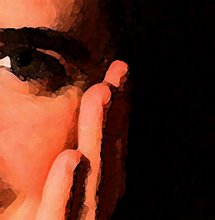The following headline in the New York Times online edition caught my eye: In Economics Departments, a Growing Will to Debate Fundamental Assumptions .
Well, it is about time.
Like my brothers before me, I studied economics, and found that some of the assumptions underlying Microeconomics 101, which forms the foundation of much of the discipline, did not correspond to my experience of how I or others made certain decisions. In microeconomics, people are assumed to be "rational" agents, always making decisions to maximize their welfare.
But unless you are a cold blooded, emotionally disconnected and hyper analytical person, you behave like a human, which is not particularly rational. Not to mention that each person's idea of "welfare", and what is in their best interest, is highly subjective and varied. That is what makes the world an interesting place in which to live, each of us perched on his/her quirky "indifference curve". On several occasions, the specifics of which elude me here, I was gently chastised by certain family members for having committed the misdemeanor of not behaving or thinking "rationally".
Has anyone ever noticed that the first three letters of this word spell "rat"? And with the exception of wanting to have the cooking skills of the protagonist in the film Ratatouille, I have no interest in behaving like a rodent. Sometimes my heart, soul and psyche long for things that my overeducated and logical brain fails to comprehend. I am learning that if my "rational" side is puzzled by what the rest of me is doing, then I am probably on the right track.
But back to this article. It begins: For many economists, questioning free-market orthodoxy is akin to expressing a belief in intelligent design at a Darwin convention: Those who doubt the naturally beneficial workings of the market are considered either deluded or crazy.
Sadly, the brainwashing happens early in the academic training, long before a Ph.D. is bestowed (if anyone who doesn't know me is reading this, I don't have one). And if you don't swallow the orthodoxy hook, line and sinker, you are pretty much out of luck. Several of my former economics professors told me - back in the 1990s - that they would not become economists if they had to make that choice again, and perhaps I am still a bit bitter or disappointed that, due to the rigidity of thought and belief in that profession, I didn't feel particularly at home there (not to mention that in that field, anyone without a Ph.D. is, shall we say, barely acknowledged).
What is frightening is the profession, which prides itself on the use of mathematical models and rigorous analyses to distinguish itself from (and sometimes to look down upon) other social sciences, is increasingly divorced from the world it is supposedly trying to understand and affect.
I hope that the New York Times article is correct, that things really are starting to change, that more economists will be climbing down from their inane ivory towers to see what life on earth is really like.
Wednesday, July 11, 2007
Subscribe to:
Post Comments (Atom)




2 comments:
I suspect that the economists, in their quest to deconstruct long-held basic assumptions, will run up against fundamental limitations to their professional expertise. 'Rationality' may be re-oriented or even expanded (e.g., to address things like the value of time, leisure, whimsy or personal quirks) without ever discerning anything important about how the moral framework(s) within which 'rationality' operates affects decisions and trade-offs.
That is, people make choices that seem utterly irrational within one moral framework and yet are not at all unpredictable or individualist. They simply require understanding a larger moral context that economics doesn't touch. In a secular moral context for example, attending a religious service or praying are complete wastes of time, confessing to a crime for which one is not a suspect is utter foolishness, and doing good that will not be seen is at best naive. And yet within most religious contexts, those things have a logic all their own that makes behavior highly predictable if one is aware of the moral rules.
Anyway, good post.
Just a suggestion though: for these aging eyes, the black background is really tough on the eyes.
Thanks for your point about moral (to which I'll add spiritual) frameworks; that is what I was trying to get at it and you nailed it! Will reconsider the color scheme, but I liked how the image I chose fades into the black background. ;-)
Post a Comment